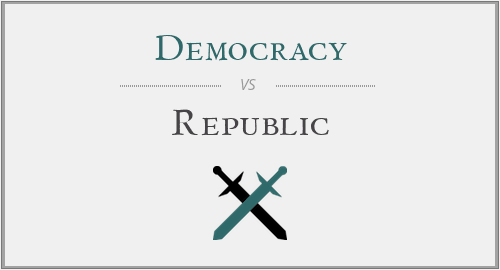
In this article, we will explore the differences and similarities between a "democracy" and a "republic".
What is a Democracy?
In a "democracy," the majority rule provides the basis for the system; it is the citizens of the country who essentially rule the government.
In fact, the word "democracy" means “rule by the people” and is derived from the Greek word “demos” (people) and “karatos, kratia” (rule, power, authority).
This can be contrasted to a country that is ruled by a family (monarchy) or by a single person (totalitarianism).
In a "democracy," the citizens are involved in how the political process takes place. This usually happens through a system of voting.
In a "democracy," there is a separation of powers.
Democracies are characterized by:
• Free and fair elections
• Protection of basic human rights: right to free speech, right to bear arms, protection against illegal property seizure, and a right to have a trial with a jury.
There are 3 Major Types of Democracies:
1. Pure Democracy (Direct Democracy)
A direct "democracy" is used with small populations, where all citizens have an equal vote, regardless of race, class, and socio-economic status. The outcome is decided by the vote of the majority, and the minority has little power.
For example:
2. Representative Democracy (Indirect Democracy)
A representative "democracy" is used with large populations, where individuals are elected and then represent the will of their constituents.
For example:
In the US, the Legislative Branch is comprised of elected officials who then make laws for the entire US.
3. Constitutional Democracy
A constitutional "democracy" has a constitution which is the highest law of the land. This constitution regulates the power of elected officials, thereby limiting the strength of the majority, limiting the power of the government, and protecting the freedom of the citizen.
For example:
In the US, the Judicial Branch decides whether constitutional rights have or have not been violated.
When states select their representatives through direct vote, they are functioning as a direct "democracy."
When those elected agents vote on behalf of those who elected them, it is a representative "democracy."
When the creation of laws and policies are governed on the principles of the constitution, it is a constitutional "democracy."
What is a Republic?
The word “republic” comes from the Latin “res publica” which is defined as “public affair.” In a republic, the country’s social, political affairs are said to be a “public affair.”
In a “republic”, the principles and rules of a constitution are the most powerful force. Because of these constitutional laws, the rights of the individual cannot be taken away by the government, nor can the rights of the minority be overturned by the will of the masses.
Democracies can be “republics”.
Oligarchies, aristocracies, and monarchies can also be “republics,” as long as the head of the government is an elected official.
A Constitutions is the most unique feature of a “Republic”
In a “republic,” the rights of the minority are protected from the majority by a constitution. A constitution can interpret and, when needed, it can overturn the laws made by the representatives that the people have elected.
For example:
Based on the Constitution, the US Judicial Branch can overturn laws made by the Legislative Branch, thereby protecting the minority from the rule of the majority (which would prevail in a pure democracy.).
There are Five Major Types of Republics:
1. Constitutional Republics:
*Limited by the laws of a formal constitution
*Secular in nature
2. Parliamentary Republics:
*Parliament Head runs the Legislature
3. Presidential Republics:
4. Federal Republics:
5. Theocratic Republics:
Just like a "democracy," a “republic” can combine its governing structures and be more than one type of “republic.”
For example:
Iran bases its government on religious law, but it has a parliament—making it a parliamentary republic.
In addition, a country can be a republic but not a democracy. Consider that Russia and North Korea both have a republic style of government, but they are not a democracy.
Final Thoughts: Is the United States a Democracy or a Republic?
It is a combination of a constitutional republic, a federal republic, and a presidential republic; and is also called a representative democracy.
Ideally, this combination of governing ideologies and methods provides for a government that is best suited to the needs of the nation it serves.




Have a discussion about this article with the community:
Report Comment
We're doing our best to make sure our content is useful, accurate and safe.
If by any chance you spot an inappropriate comment while navigating through our website please use this form to let us know, and we'll take care of it shortly.
Attachment
You need to be logged in to favorite.
Log In